Wizardry 8 Preview
Our own Desslock takes an early look at the latest entry in this legendary RPG series.
During the 1980s, the RPG genre was dominated by the Ultima, Might and Magic, and Wizardry series. Yet in the early 1990s, each of those legendary series inexplicably stopped production, even though they were creatively and commercially more successful than ever. For years, RPG fans exchanged rumors and theories about the possibilities of new games in these classic series, and eventually that patience was rewarded by more tangible confirmation that each of those series would, in fact, return. The development teams behind the new projects were faced with the unenviable burden of updating the series in a manner that both satisfied existing fans and attracted an even broader audience.
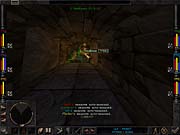
The Might and Magic series was first to respawn with the release of 1998's Might and Magic VI: The Mandate of Heaven, which was followed by two substantially similar sequels that were each successively less satisfying. In spite of the dated visuals, collectively the games are generally regarded as a largely successful trilogy. RPG fans had to wait longer for the return of the core Ultima series, and most were disappointed with the ironically premature product that was inflicted upon them as Ultima IX: Ascension. While it was disappointing that Ultima IX was initially released in such incomplete, unpolished form, it was even more distressing to veteran fans of the series that the game bore so little resemblance to previous installments.
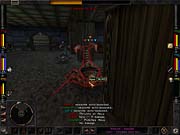
Now, at last, the Wizardry series is on the verge of being reborn. There are still a few obstacles delaying the game's release including, most notably, the lack of a North American publisher since Sir-Tech Software was closed down several years ago. Developer Sir-tech Canada Ltd. has since inked deals to publish games in its Jagged Alliance series with Take Two and Interplay, but to date a publishing agreement for Wizardry 8 has yet to be announced. The game itself, however, is virtually complete, and the developer has attempted to craft an adventure that is as graphically striking as Ultima IX and yet is as faithful to previous installments in the series as the most recent Might and Magic games have been. Despite those intentions, the extensive period of time the game has spent in development has thwarted the development team's goal of delivering consistently impressive graphics, but Wizardry 8 is definitely very faithful to both the style and the history of the series.
It's actually surprising how extensively the creators of the game have attempted to cater to the veterans of the series. Previous experience with the series isn't required though, and Wizardry newbies should find the game easy to play from the outset because of its excellent interface, but experienced Wizardry players should be particularly impressed by some of this sequel's features. Even though the last core game in the series, Wizardry 7: Crusaders of the Dark Savant, came out as a DOS game in the early 1990s, players are given the option of transferring characters from that game or from its Windows 1995 rerelease, Wizardry Gold. While there may not be many of you who have retained saved games from such a relatively ancient game, the developer has provided some significant incentives, which would make it worthwhile for you to track down your old Wizardry 7 disks. For example, imported characters start the game with additional experience, items, and skills, and the game is customized to reflect the alliances you made during the previous game. While it's not unusual for a role-playing game to feature multiple endings, Wizardry 8 actually features four different beginnings that are dependent upon the faction allegiances formed during Wizardry 7. In order to reward experienced players with a more personalized experience, the developer has admirably gone above and beyond what even veteran fans could reasonably have expected.
Bane of the Savant
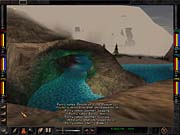
The plot of the game picks up shortly after the events depicted in Crusaders of the Dark Savant. The Dark Savant himself is in control of the Astral Dominae, an ancient artifact that gives its owner control over life. Your party has ventured to the ancient world of Dominus, birthplace of the Cosmic Lords that shaped the known universe, to stop the Dark Savant from gaining control of the two other ancient artifacts that would grant him the power of the Cosmic Lords. Like the early Ultima games and most Might and Magic games, the Wizardry games primarily feature swords and sorcery gameplay but also have some rudimentary futuristic science fiction elements. But while those other series have lately either completely abandoned or minimized such science fiction aspects, Wizardry 8 has embraced the series' hybrid blend of starships and crossbows. If you prefer more homogeneous fantasy environments, you may dislike the mixture of such inherently incongruent elements, but other gamers may find the game's distinct style refreshing after being inundated with Tolkien-esque landscapes.
You can create six characters and supplement that adventuring party with up to two additional nonplayer characters. You'll have complete control over the nonplayer characters while they're in your party, but they'll leave in accordance with their own agendas. The available character classes and races are very similar to those in previous Wizardry games and are fairly typical of swords and sorcery RPGs in general, except there are far more options than in a typical RPG. While all of the usual suspects appear, such as dwarven fighters and elven mages, several of the 11 races and 15 character classes in the game are more unique. Races include the human-dragon hybrid dracons; the not-so-domestic catlike felpurrs and doglike rawulfs; and the alien mooks.
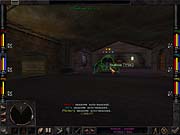
The only completely new character class is the gadgeteer. Perhaps personifying the game's mixture of science fiction and medieval fantasy elements, gadgeteers have expertise in modern weaponry and can combine seemingly disparate items into useful items more effectively than Mr. T and his A-team. Other exotic character classes include the valkyries, who can occasionally survive blows that would be fatal to other characters; noble samurai and lords; psionics; and scholarly bishops, who have limited spellcasting abilities and special knowledge of magical items.
In addition to having a distinct race and character class, each character will have a personality that you can choose when creating that character. There are 36 different personalities that you can choose from, ranging from arrogant to laid-back. The personalities you assign your characters may come back to haunt you, however, as your party members will bark out comments that their personalities apparently deem appropriate in response to events within the game. The series is known for occasional bursts of tongue-in-cheek humor, often initiated when a character used to medieval settings encounters futuristic technology. But the characters in our prerelease build frequently expounded goofy heckling or nonsensical queries when another party member was struck down, which detracted from the apparent gravity of the event. Hopefully Sir-tech Canada Ltd. can give the characters personalities that are as entertaining as those the company imbued into the mercenaries in its Jagged Alliance series.
Smooth 3D Sailing
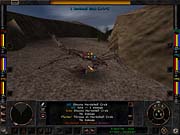
The last Wizardry game was released so long ago that Wizardry 8 will actually be the first game in the series to offer smoothly scrolling first-person perspective movement, a feature initially introduced way back in 1992's Ultima Underworld. All of the characters, items, and monsters are rendered in 3D polygons, and the gaming world features numerous towering heights to demonstrate the new 3D engine. While naturally a huge graphical improvement over previous games in the series, the 3D engine is pretty rudimentary compared to those featured in action games released during the past several years or in the RPGs released since Ultima IX: Ascension. The monster animations are excellent, however, as blobs of green slime gurgle and slither, and massive swallowers lunge after your party, attempting to devour your characters intact.
Another belated addition to the series is a capable automap, and the one included with Wizardry 8 lets you zoom the viewing distance in and out, scribble or erase notes, and highlight specific areas. The complexity of the 3D environments reduces the utility of the map, but the developers have done as well as anyone has using a 2D automap to depict a labyrinthine 3D gaming world. The game's interface is reasonably customizable: It will let you view the gaming world in traditional Wizardry style with each of your party members' portraits framing the screen, or it will let you opt for a much larger view of the gaming world.
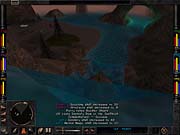
As you'd expect from a traditional-style RPG, there are hundreds of monsters and dozens of different spells. Each of the approximately 90 spells is assigned to one of six realms: earth, air, water, fire, divine, and mental, and spells can be further differentiated by allocating different power levels at the time of casting. There are around 100 different monster character models and several variations of most of them, accounting for more than 300 monsters in total. There are a lot of mundane creatures early on, such as giant rats, bats, and numerous deviations of slime, but there's also plenty of more formidable and impressive creatures, like the scorpionlike apus and the towering golems.
Characters are rated in more than 40 skills, which will constantly improve during the course of the game, both through use and additional points that are allocated from a bonus pool allotted each time an experience level is gained. Instead of featuring real-time combat like most first-person perspective games, combat unfolds in distinct phases. During each phase, you'll choose an appropriate action for each party member. Once you've allocated actions, a combat round unfolds, as your characters and their opponents take actions in an order generally determined by their speed and initiative. If you've elected to move your party during the planning phase, at some point during the combat round you'll get the chance to do so, although if you move too far your characters will be denied the opportunity to take other actions. It's an effective system, which was recently capably used in the wargame Combat Mission. You can also simulate real-time combat by electing to have the rounds run continuously.
Gameplay predominately consists of exploring each of the 30 expansive sectors in the game, liberating them of loot and hostile creatures, and establishing allegiances in order to assist you in your quest to stop The Dark Savant. To pick locks and disarm traps, capable characters will have to unravel their systems of levers and triggers on a separate gaming screen provided for such a purpose. Conversations with nonplayer characters are primarily menu driven; although unlike what you'll find in any recent RPGs, you can also get additional information from NPCs by typing in your own keywords to supplement or replace questions available in the menu. It's a system reminiscent of the keyword parsers that used to dominate the genre, which is just further evidence that the development team has intended to create a modern but very traditional-style RPG.
Wizardry 8's dated polygonal graphics and phased combat are going to limit the game's appeal to fans of the genre, but those fans should be very satisfied. Wizardry 8 is almost complete, and it looks to be very much a traditional-style RPG, with gameplay that's constantly rewarding as your characters are consistently gaining better skills, encountering more challenging opponents, acquiring more capably weaponry, and exploring more interesting areas. It's an addictive formula that the Wizardry games used to help establish the genre, and Wizardry 8 may be one of the most polished iterations of that formula yet.
Got a news tip or want to contact us directly? Email news@gamespot.com
Join the conversation